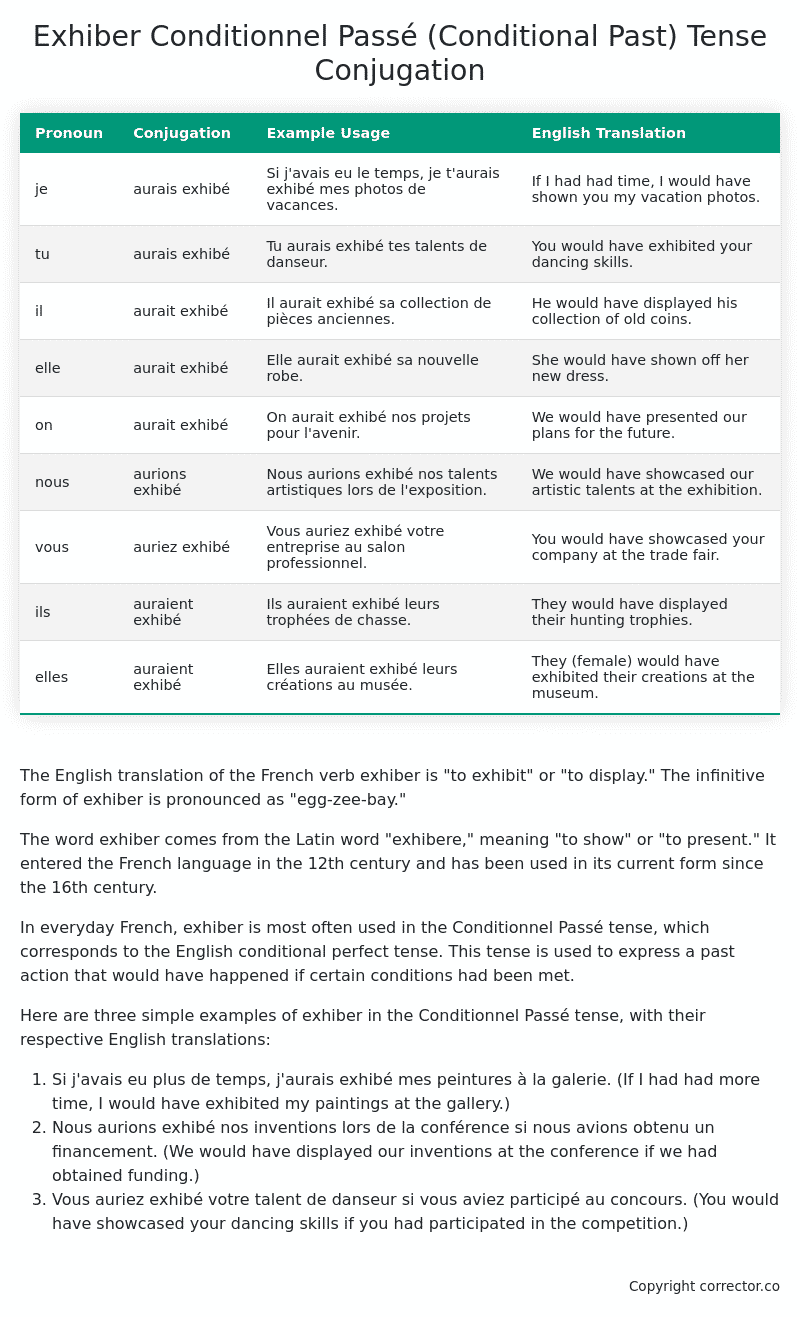Conditionnel Passé (Conditional Past) Tense Conjugation of the French Verb exhiber
Introduction to the verb exhiber
The English translation of the French verb exhiber is “to exhibit” or “to display.” The infinitive form of exhiber is pronounced as “egg-zee-bay.”
The word exhiber comes from the Latin word “exhibere,” meaning “to show” or “to present.” It entered the French language in the 12th century and has been used in its current form since the 16th century.
In everyday French, exhiber is most often used in the Conditionnel Passé tense, which corresponds to the English conditional perfect tense. This tense is used to express a past action that would have happened if certain conditions had been met.
Here are three simple examples of exhiber in the Conditionnel Passé tense, with their respective English translations:
- Si j’avais eu plus de temps, j’aurais exhibé mes peintures à la galerie. (If I had had more time, I would have exhibited my paintings at the gallery.)
- Nous aurions exhibé nos inventions lors de la conférence si nous avions obtenu un financement. (We would have displayed our inventions at the conference if we had obtained funding.)
- Vous auriez exhibé votre talent de danseur si vous aviez participé au concours. (You would have showcased your dancing skills if you had participated in the competition.)
Table of the Conditionnel Passé (Conditional Past) Tense Conjugation of exhiber
| Pronoun | Conjugation | Example Usage | English Translation |
|---|---|---|---|
| je | aurais exhibé | Si j’avais eu le temps, je t’aurais exhibé mes photos de vacances. | If I had had time, I would have shown you my vacation photos. |
| tu | aurais exhibé | Tu aurais exhibé tes talents de danseur. | You would have exhibited your dancing skills. |
| il | aurait exhibé | Il aurait exhibé sa collection de pièces anciennes. | He would have displayed his collection of old coins. |
| elle | aurait exhibé | Elle aurait exhibé sa nouvelle robe. | She would have shown off her new dress. |
| on | aurait exhibé | On aurait exhibé nos projets pour l’avenir. | We would have presented our plans for the future. |
| nous | aurions exhibé | Nous aurions exhibé nos talents artistiques lors de l’exposition. | We would have showcased our artistic talents at the exhibition. |
| vous | auriez exhibé | Vous auriez exhibé votre entreprise au salon professionnel. | You would have showcased your company at the trade fair. |
| ils | auraient exhibé | Ils auraient exhibé leurs trophées de chasse. | They would have displayed their hunting trophies. |
| elles | auraient exhibé | Elles auraient exhibé leurs créations au musée. | They (female) would have exhibited their creations at the museum. |
Other Conjugations for Exhiber.
Le Present (Present Tense) Conjugation of the French Verb exhiber
Imparfait (Imperfect) Tense Conjugation of the French Verb exhiber
Passé Simple (Simple Past) Tense Conjugation of the French Verb exhiber
Passé Composé (Present Perfect) Tense Conjugation of the French Verb exhiber
Futur Simple (Simple Future) Tense Conjugation of the French Verb exhiber
Futur Proche (Near Future) Tense Conjugation of the French Verb exhiber
Plus-que-parfait (Pluperfect) Tense Conjugation of the French Verb exhiber
Passé Antérieur (Past Anterior) Tense Conjugation of the French Verb exhiber
Futur Antérieur (Future Anterior) Tense Conjugation of the French Verb exhiber
Subjonctif Présent (Subjunctive Present) Tense Conjugation of the French Verb exhiber
Subjonctif Passé (Subjunctive Past) Tense Conjugation of the French Verb exhiber
Subjonctif Imparfait (Subjunctive Imperfect) Tense Conjugation of the French Verb exhiber
Subjonctif Plus-que-parfait (Subjunctive Pluperfect) Tense Conjugation of the French Verb exhiber
Conditionnel Présent (Conditional Present) Tense Conjugation of the French Verb exhiber
Conditionnel Passé (Conditional Past) Tense Conjugation of the French Verb exhiber (this article)
L’impératif Présent (Imperative Present) Tense Conjugation of the French Verb exhiber
L’infinitif Présent (Infinitive Present) Tense Conjugation of the French Verb exhiber
Struggling with French verbs or the language in general? Why not use our free French Grammar Checker – no registration required!
Get a FREE Download Study Sheet of this Conjugation 🔥
Simply right click the image below, click “save image” and get your free reference for the exhiber Conditionnel Passé tense conjugation!

Exhiber – About the French Conditionnel Passé (Conditional Past) Tense
Formation
Common Everyday Usage Patterns
Expressing Unreal Past Scenarios
Polite Requests or Suggestions
Expressing Doubt or Uncertainty
Interactions with Other Tenses
Conditional Present
Indicative Past Tenses
Conditional Future
Summary
Want More?
I hope you enjoyed this article on the verb exhiber. Still in a learning mood? Check out another TOTALLY random French verb conjugation!


